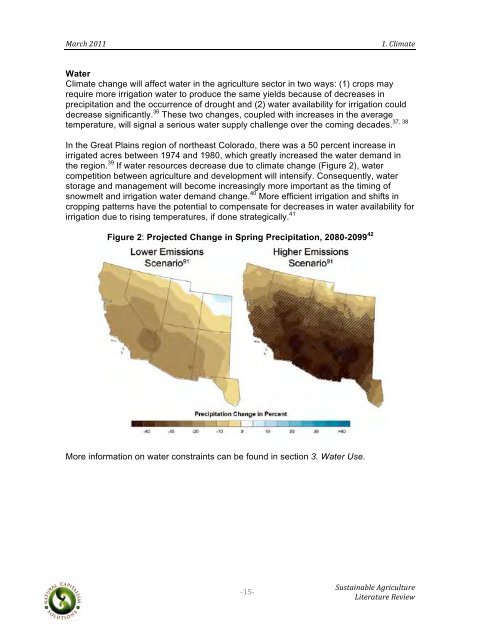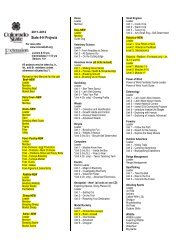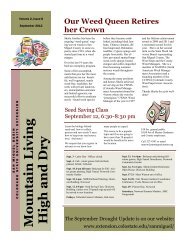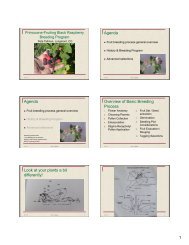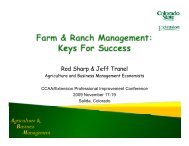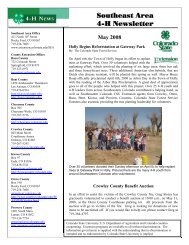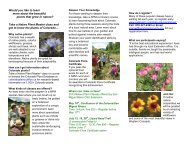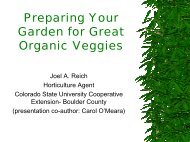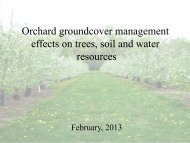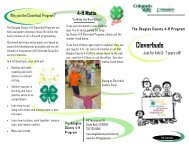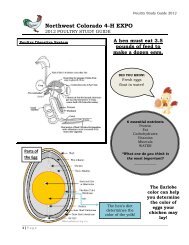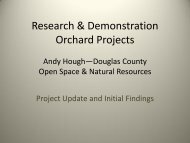- Page 1 and 2: SUSTAINABLE AGRICULTURE LITERATURE
- Page 3 and 4: ! ! "#$%&!'())! ! !*+,-#./#012!34$.
- Page 5 and 6: ! ! "#$%&!'())! ! !*+,-#./#012!34$.
- Page 7 and 8: ! "#$%&!'())! ! 9:2%+-.72!*+;;#$
- Page 9 and 10: ! ! !! "#$%&!'())! !!!!!!!!!!!!!!!!
- Page 11 and 12: ! ! !! "#$%&!'())! !!!!!!!!!!!!!!!!
- Page 13: ! ! !! "#$%&!'())! !!!!!!!!!!!!!!!!
- Page 17 and 18: ! ! !! "#$%&!'())! !!!!!!!!!!!!!!!!
- Page 19 and 20: ! ! !! "#$%&!'())! !!!!!!!!!!!!!!!!
- Page 21 and 22: ! ! !! "#$%&!'())! !!!!!!!!!!!!!!!!
- Page 23 and 24: ! ! !! "#$%&!'())! !!!!!!!!!!!!!!!!
- Page 25 and 26: ! !! "#$%&!'())! ! ! ! ! ! ! !!!!!!
- Page 27 and 28: ! !! "#$%&!'())! ! ! ! ! ! ! !!!!!!
- Page 29 and 30: ! !! "#$%&!'())! ! ! ! ! ! ! !!!!!!
- Page 31 and 32: ! !! "#$%&!'())! ! ! ! ! ! ! !!!!!!
- Page 33 and 34: ! !! "#$%&!'())! ! ! ! ! ! ! !!!!!!
- Page 35 and 36: ! !! "#$%&!'())! ! ! ! ! ! ! !!!!!!
- Page 37 and 38: ! !! "#$%&!'())!! !!!!!!!!!!!!!!!!!
- Page 39 and 40: ! !! "#$%&!'())!! !!!!!!!!!!!!!!!!!
- Page 41 and 42: ! !! "#$%&!'())!! !!!!!!!!!!!!!!!!!
- Page 43 and 44: ! !! "#$%&!'())!! !!!!!!!!!!!!!!!!!
- Page 45 and 46: ! !! "#$%&!'())!! !!!!!!!!!!!!!!!!!
- Page 47 and 48: ! !! "#$%&!'())!! !!!!!!!!!!!!!!!!!
- Page 49 and 50: ! !! "#$%&!'())!!!!!!!! !!!!!!!!!!!
- Page 51 and 52: ! !! "#$%&!'())!!!!!!!! !!!!!!!!!!!
- Page 53 and 54: ! !! "#$%&!'())!!!!!!!! !!!!!!!!!!!
- Page 55 and 56: ! !! "#$%&!'())!! !!!!!!!!!!!!!!!!!
- Page 57 and 58: ! !! "#$%&!'())!! !!!!!!!!!!!!!!!!!
- Page 59 and 60: ! !! "#$%&!'())!! !!!!!!!!!!!!!!!!!
- Page 61 and 62: ! !! "#$%&!'())!! !!!!!!!!!!!!!!!!!
- Page 63 and 64: ! !! "#$%&!'())!! !!!!!!!!!!!!!!!!!
- Page 65 and 66:
! !! "#$%&!'())!! !!!!!!!!!!!!!!!!!
- Page 67 and 68:
! !! "#$%&!'())!! !!!!!!!!!!!!!!!!!
- Page 69 and 70:
! !! "#$%&!'())!! !!!!!!!!!!!!!!!!!
- Page 71 and 72:
! !! "#$%&!'())!! !!!!!!!!!!!!!!!!!
- Page 73 and 74:
! ! !! "#$%&!'())!! !!!!!!!!!!!!!!!
- Page 75 and 76:
! ! !! "#$%&!'())!! !!!!!!!!!!!!!!!
- Page 77 and 78:
! ! !! "#$%&!'())!! !!!!!!!!!!!!!!!
- Page 79 and 80:
! ! !! "#$%&!'())!! !!!!!!!!!!!!!!!
- Page 81 and 82:
! ! !! "#$%&!'())!! !!!!!!!!!!!!!!!
- Page 83 and 84:
! ! !! "#$%&!'())!! !!!!!!!!!!!!!!!
- Page 85 and 86:
! ! !! "#$%&!'())!! !!!!!!!!!!!!!!!
- Page 87 and 88:
! ! !! "#$%&!'())!! !!!!!!!!!!!!!!!
- Page 89 and 90:
! ! !! "#$%&!'())!! !!!!!!!!!!!!!!!
- Page 91 and 92:
! ! !! "#$%&!'())!! !!!!!!!!!!!!!!!
- Page 93 and 94:
! ! !! "#$%&!'())!! !!!!!!!!!!!!!!!
- Page 95 and 96:
! ! !! "#$%&!'())!! !!!!!!!!!!!!!!!
- Page 97 and 98:
! ! !! "#$%&!'())!! !!!!!!!!!!!!!!!
- Page 99 and 100:
! ! !! "#$%&!'())!! !!!!!!!!!!!!!!!
- Page 101 and 102:
! !! "#$%&!'())!! !!!!!!!!!!!!!!!!!
- Page 103 and 104:
! !! "#$%&!'())!! !!!!!!!!!!!!!!!!!
- Page 105 and 106:
! !! "#$%&!'())!! !!!!!!!!!!!!!!!!!
- Page 107 and 108:
! !! "#$%&!'())!! !!!!!!!!!!!!!!!!!
- Page 109 and 110:
! !! "#$%&!'())!! !!!!!!!!!!!!!!!!!
- Page 111 and 112:
! !! "#$%&!'())!! !!!!!!!!!!!!!!!!!
- Page 113 and 114:
! !! "#$%&!'())!! !!!!!!!!!!!!!!!!!
- Page 115 and 116:
! !! "#$%&!'())!! !!!!!!!!!!!!!!!!!
- Page 117 and 118:
! !! "#$%&!'())!! !!!!!!!!!!!!!!!!!
- Page 119 and 120:
! !! "#$%&!'())!! !!!!!!!!!!!!!!!!!
- Page 121 and 122:
! !! "#$%&!'())!! !!!!!!!!!!!!!!!!!
- Page 123 and 124:
! !! "#$%&!'())!! !!!!!!!!!!!!!!!!!
- Page 125 and 126:
! !! "#$%&!'())!! !!!!!!!!!!!!!!!!!
- Page 127 and 128:
! !! "#$%&!'())!! !!!!!!!!!!!!!!!!!
- Page 129 and 130:
! !! "#$%&!'())!! !!!!!!!!!!!!!!!!!
- Page 131 and 132:
! !! "#$%&!'())!! !!!!!!!!!!!!!!!!!
- Page 133 and 134:
! !! "#$%&!'())!! !!!!!!!!!!!!!!!!!
- Page 135 and 136:
! !! "#$%&!'())!! !!!!!!!!!!!!!!!!!
- Page 137 and 138:
! !! "#$%&!'())!! !!!!!!!!!!!!!!!!!
- Page 139 and 140:
! !! "#$%&!'())!! !!!!!!!!!!!!!!!!!
- Page 141 and 142:
! !! "#$%&!'())!! !!!!!!!!!!!!!!!!!
- Page 143 and 144:
! !! "#$%&!'())!! !!!!!!!!!!!!!!!!!
- Page 145 and 146:
! !! "#$%&!'())!! !!!!!!!!!!!!!!!!!
- Page 147 and 148:
! "#$%&!'())!! !!!!!!!!!!!!!!!!!!!!
- Page 149 and 150:
! "#$%&!'())!! !!!!!!!!!!!!!!!!!!!!
- Page 151 and 152:
! "#$%&!'())!! !!!!!!!!!!!!!!!!!!!!
- Page 153 and 154:
! "#$%&!'())!! !!!!!!!!!!!!!!!!!!!!
- Page 155 and 156:
! "#$%&!'())!! !!!!!!!!!!!!!!!!!!!!
- Page 157 and 158:
! "#$%&!'())!! !!!!!!!!!!!!!!!!!!!!
- Page 159 and 160:
! "#$%&!'())!! !!!!!!!!!!!!!!!!!!!!
- Page 161 and 162:
! "#$%&!'())!! !!!!!!!!!!!!!!!!!!!!
- Page 163 and 164:
! "#$%&!'())!! !!!!!!!!!!!!!!!!!!!!
- Page 165 and 166:
! "#$%&!'())!! !!!!!!!!!!!!!!!!!!!!
- Page 167 and 168:
! "#$%&!'())!! !!!!!!!!!!!!!!!!!!!!
- Page 169 and 170:
! "#$%&!'())!! !!!!!!!!!!!!!!!!!!!!
- Page 171 and 172:
! "#$%&!'())!! !!!!!!!!!!!!!!!!!!!!
- Page 173 and 174:
! "#$%&!'())!! !!!!!!!!!!!!!!!!!!!!
- Page 175 and 176:
! "#$%&!'())!! !!!!!!!!!!!!!!!!!!!!
- Page 177 and 178:
! "#$%&!'())!! !!!!!!!!!!!!!!!!!!!!
- Page 179 and 180:
! "#$%&!'())!! !!!!!!!!!!!!!!!!!!!!
- Page 181 and 182:
! "#$%&!'())!! !!!!!!!!!!!!!!!!!!!!
- Page 183 and 184:
! "#$%&!'())!! !!!!!!!!!!!!!!!!!!!!
- Page 185 and 186:
! "#$%&!'())!! !!!!!!!!!!!!!!!!!!!!
- Page 187 and 188:
! "#$%&!'())!! !!!!!!!!!!!!!!!!!!!!
- Page 189 and 190:
! "#$%&!'())!! !!!!!!!!!!!!!!!!!!!!
- Page 191 and 192:
! "#$%&!'())!! !!!!!!!!!!!!!!!!!!!!
- Page 193 and 194:
! "#$%&!'())!! !!!!!!!!!!!!!!!!!!!!
- Page 195 and 196:
! "#$%&!'())!! !!!!!!!!!!!!!!!!!!!!
- Page 197 and 198:
! "#$%&!'())!! !!!!!!!!!!!!!!!!!!!!
- Page 199 and 200:
! "#$%&!'())!! !!!!!!!!!!!!!!!!!!!!
- Page 201 and 202:
! "#$%&!'())!! !!!!!!!!!!!!!!!!!!!!
- Page 203:
! "#$%&!'())!! !!!!!!!!!!!!!!!!!!!!


